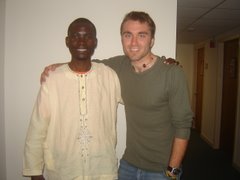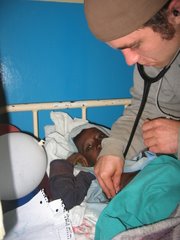 Rwanda is the most densely populated country in Africa, and its capitol is the smallest city of a million you will ever find. Meet someone once and you are bound to run into them again. Last weekend at Gacaca people greeted me with a great bit of hostility – particularly the woman I sat next to who, for no apparent reason, relentlessly chastised me for jotting notes and drawing sketches. Recognizing quickly that we were not going to get along, I tried to avoid her, but throughout the remainder of the hearing she and her friend glared an uncomfortable, unwelcoming stare – unnerving in its own right, and all the more coming from a foot away. When court adjourned I noticed the killer’s family approaching her, and I turned away. “She’s one of them,” I thought, shuddering, and hoped we’d never meet again.
Rwanda is the most densely populated country in Africa, and its capitol is the smallest city of a million you will ever find. Meet someone once and you are bound to run into them again. Last weekend at Gacaca people greeted me with a great bit of hostility – particularly the woman I sat next to who, for no apparent reason, relentlessly chastised me for jotting notes and drawing sketches. Recognizing quickly that we were not going to get along, I tried to avoid her, but throughout the remainder of the hearing she and her friend glared an uncomfortable, unwelcoming stare – unnerving in its own right, and all the more coming from a foot away. When court adjourned I noticed the killer’s family approaching her, and I turned away. “She’s one of them,” I thought, shuddering, and hoped we’d never meet again.The following Friday night a doctor friend of mine and I were walking through Nyamirambo – a bustling layman’s neighborhood – when a car pulled up next to us. Friends in the front seat greeted my friend, then introduced themselves to me. With a wink and a smile, I took them off guard in their own language as I always like to do, and everyone laughed. “Rashonje?” they asked. Yeah, we were hungry. So at their invitation, we got into the car – me first, then my friend. After settling into the back seat, I turned to greet the woman next to me. She looked familiar, and I knew I had seen her somewhere before. She spoke first, in a startled voice. “Hi. I know you from Gacaca”. Oh shit. Squeezed into the back of a car – we were cramped just as we’d been in that packed courtroom, and I could neither leave nor hide. Just my luck she was a friend of a friend of a friend – and now we were going out to eat together. Given the choice to pretend nothing happened or address head-on our uncomfortable history, I chose the latter.
Dinner was powerful. As it turned out, both of us wrongfully assumed each other’s identities. Recounting how we came to this realization is not nearly as important as her story – so to save time, suffice it to say that she was Tutsi and present when the man on trial killed her mother and sister – and because I was white and at Gacaca, she assumed I was French – a supporter of both the former genocidal government and the current corrupt judicial system.
 In her neighborhood, a community of approximately 500 Tutsi, there were only 17 survivors. The Hutu on trial, an obnoxiously fat man, was a famous killer in the area, directly responsible for murders in at least ten homes - and who knows how many others for which he was an agitator and accomplice. He had previously been sentenced to 27 years in prison, but his family is very rich – and through obvious corruption, his file, stored at the prison, was conveniently erased. When the Tutsi community cried injustice, officials agreed to start the trials over again - from scratch.
In her neighborhood, a community of approximately 500 Tutsi, there were only 17 survivors. The Hutu on trial, an obnoxiously fat man, was a famous killer in the area, directly responsible for murders in at least ten homes - and who knows how many others for which he was an agitator and accomplice. He had previously been sentenced to 27 years in prison, but his family is very rich – and through obvious corruption, his file, stored at the prison, was conveniently erased. When the Tutsi community cried injustice, officials agreed to start the trials over again - from scratch.Before I arrived at Gacaca, my friend gave her testimony. Her mom was screaming when the Hutus broke into their home, “Mukuobwa, come here – come to mommy”. But she didn’t – she ran and hid nearby. Two minutes later, gun shots that still burn in her ears. Pow Pow. Then silence. After some time, she went back to find her mother’s body stuffed beneath a bed.
The fat man stood and began to speak. “Yeah, I remember your mother,” he feigned a thoughtful, sympathetic voice. And then in a sick and biting tone, continued “she had a distinct face. I remember shoving her beneath the bed. But I did not kill her – I just helped put her there”.
Does that shock you? It sure did me. But try to understand the overwhelming number of convicted murderers (with 300,000 killers, at two trials per day every day it would take 410 years to hear every case), coupled with limited prison space and no death penalty. The judicial system does not have room for mere accomplices – so all he has to do is claim a mere passive participatory status and he is a free man. That gives him freedom to ruthlessly interject pain, admitting, as she stood giving her testimony, that he was indeed there – that he saw the horror in her mother’s eyes as she voraciously grasped for life with one arm and held Mukuobwa’s sister with the other, and that his warm hands knew what her limp body felt like. That’s sick.
After the court dismissed for deliberation, as I said in the introductory paragraph, the killer’s family approached Mukuobwa. That is when I turned away, missing the humiliation and mocking so disgustingly lavished on a vulnerable, hurting young survivor. “Whatever you are saying and doing is only a waste of time because he won’t go back to jail. It was the inyenzi who killed themselves. They were inyenzi, weren’t they?” And I wasn’t watching when the onlookers chuckled in unison each time she spat inyenzi – cockroach – a derogatory Hutu term for Tutsi.
 When our conversation came to a pause, my friend quietly added, “For us, genocide is still going on” - a powerful statement coming from a man who effectively escapes pain through Tai Chi and a fortress of other peaceful philosophies. “I really believe survivors are not safe. We will be killed, because genocide is still very much in the minds of people”.
When our conversation came to a pause, my friend quietly added, “For us, genocide is still going on” - a powerful statement coming from a man who effectively escapes pain through Tai Chi and a fortress of other peaceful philosophies. “I really believe survivors are not safe. We will be killed, because genocide is still very much in the minds of people”.I should pause here to explain this thought. Last week I sat on a balcony with a former UN employee who was here during 1994, and we talked about the genocide until well past sundown. Genocide doesn’t just happen, he pointed out. This thing had been brewing for decades, and its philosophy had been passed down from father to child for generations. This was a very well organized plan – and there are still people who wish to see it completed.
Psychologists say the killing became addictive, and I have yet to find anyone who disagrees. The guilt of murder is so heavy that the only way to lessen the weight of what one did to a single individual is to do it over and over again. That’s why he says present day Hutu hate is really only Hutu guilt manifested – and that the only relief will be to kill everyone who reminds them of their past.
I asked an innocent question that proved to be almost comical to my dinner companions. “Do you think I have seen killers on the street?” Of course. All the time they are being released from prison, making room for others. “You can just catch them on the streets – but they code what they say,” he said. “They call it university. If two were in prison together, then see each other in town after they get out, they might say, ‘Hey – I was with you in university. And they are always being released because the government does not know what to do. It can’t kill them and can’t imprison them. How can there be justice? There cannot be”.
 In villages, killers are even judges on the Gacaca panels – and if there are 8 judges in all, quite easily there might be only 1 or 2 Tutsi. This, too, is a difficult position to be in, because Tutsi judges are still killed. In fact, Tutsi survivors in general are killed so frequently, says he, that although he sees it in the newspaper, he doesn’t even bother to read the article because he knows its there and that nobody is doing anything about it.
In villages, killers are even judges on the Gacaca panels – and if there are 8 judges in all, quite easily there might be only 1 or 2 Tutsi. This, too, is a difficult position to be in, because Tutsi judges are still killed. In fact, Tutsi survivors in general are killed so frequently, says he, that although he sees it in the newspaper, he doesn’t even bother to read the article because he knows its there and that nobody is doing anything about it.I asked what the new identity cards look like. He got his out to show me – then Mukuobwa, from across the table, softly said she had an old one, her mother’s, that she pulled from her body that afternoon. And then abruptly, yet quite naturally, we left the restaurant. And it occurred to me that even that moment, leaving the restaurant, was symbolic of life in Rwanda – abrupt, jagged, and yet so accustomed to being abrupt and jagged that it almost seemed fluid.
*Post note from 3 March – last week we went together to hear the verdict. He was guilty on all counts and re-sentenced to 27 years in prison.



No comments:
Post a Comment